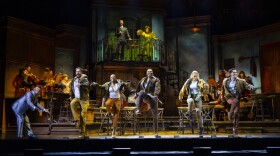Sibling rivalry has been around for as long as recorded time. Just go the Cain and Able story in the Old Testament of the Bible. Family dysfunction also seems to have been here forever. Refer to a number of stories within the same source.
Tomorrow night, the Black Theatre Troupe of Upstate NY is opening “Topdog/Underdog”, a play that addresses both issues, plus adds revealing insights to the social plight of the African-American community. The play, which won the Pulitzer Prize for Drama in 2002, is running this weekend and next at Capital Repertory Theatre in Albany.
It’s both sad and enlightening that the social issues about race, class and power in America has changed little in the 20 years since the play was first produced. But, despite the specific social issues addressed in the themes, it’s almost impossible to leave the play without thinking about the critical problem society has breaking the cycle of self-destruction that dooms an entire class of people to guaranteed poverty and a potential life of crime.
The founder of the company and director of “Topdog/Underdog”, Jean-Remy Monnay, who is affectionately known throughout the theater community as Remy” says the story of a dysfunctional family is as relevant to white audiences as it is to black theatergoers. “Black audiences will see it and cry,” he says. “They will experience their everyday world.” He insists that white audiences will get it too. “Every family understands dysfunction,” he explains.
Yet, he’s concerned that because the brothers in the play are black and criminals who are not loveable people, white audiences are prone to miss the true message of the work. It is his belief that the play in essence touches the root cause of the problems concerning poverty and class in the United States. “It is that too many people do not realize need for education, health and mental care for those in need. Especially a need to grow up in a loving supportive family environment,” he says.
As for addressing those issues in the play, he starts with family dysfunction. The two-character play is about two African-American brothers who are about 30. The oldest son was named Lincoln. When the second son was born the father named him Booth, because he thought it funny. Do you need to know more about the environment in which they were raised? You might think not, but as described by the brothers it was worse than you can imagine.
As teenagers they were given a small sum money and told them they were on their own. Link became an expert street hustler specializing in dealing three-card monte. He stopped after a friend was murdered for doing the same thing. He is now paid by a shooting arcade to dress like Abraham Lincoln so people can shoot at him. Booth is a shop-lifter who idolizes his brother’s skill as a card hustler and wants Link to teach him the tricks of the trade.
Link is separated from his wife and lives in his brother’s small apartment. Though connected and dependent on each other their lives are toxic and doomed to get worse. It becomes sibling rivalry at its worst.
Remy has admired the play since it opened and admits he still regrets not accepting to play a role in the play 15 years ago. He explains that as an immigrant from Hatti he felt his English was not strong enough to do justice to Parks intense dialogue. He takes this moment to point out that because the play is rather absurdist in nature, it provides a lot of humor. “Sometimes you have to laugh even though you don’t want to” he says.
Even though social problems have not visibly changed a lot, the always optimistic Remy says he is content if one person leaves the play with a new understanding that most of the social problems of those who live amongst us starts with not having a solid home and a nurturing upbringing.
His thoughts echoes playwright Parks, who when asked what the play is about answered, “ I think it’s about what it means to be connected to family and, in the bigger sense to the family of man.”
“Topdog/Underdog” produced by the Black Theatre Troupe of Upstate New York. At Capital Repertory Theatre, Albany. Through March 12. For tickets and schedule information call 518-346-6204 or go to capitalrep.org.
Bob Goepfert is theater reviewer for the Troy Record.
The views expressed by commentators are solely those of the authors. They do not necessarily reflect the views of this station or its management.




